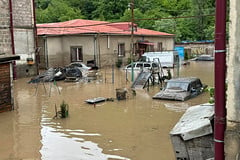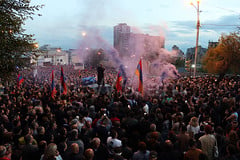The Permanent Representative of Armenia to the UN, Ambassador Mher Margaryan, made a statement at the UN Security Council open debate “Peace through dialogue: the contribution of regional, sub-regional and bilateral arrangements to the prevention and peaceful resolution of disputes.”
“Thank you, Mr. President, for convening this meeting and I want to express my appreciation to the distinguished briefers for their contribution to today's debate.
The regional arrangements could play an essential role in the maintenance of international peace and security as prescribed by chapter 6 and chapter 8 of the UN Charter by acting in support of peaceful resolution of disputes and addressing and preventing conflict situations. Often such arrangements have a better understanding of the historical context, root causes and complexities of the conflicts within their respective regions, whereby their access and proximity can offer more immediate and customized tools for dialogue and mediation.
It was precisely in line with these principles that back in 1992 the Conference on Security and Cooperation in Europe (later OSCE) formed a specific initiative aimed at resolving the [Artsakh] Nagorno-Karabakh conflict with the endorsement of the UN Security Council co-chaired by France, the Russian Federation and the United States. The OSCE Minsk Group was established with an international mandate for conducting mediation and negotiations as regional arrangement prescribed by the UN Charter.
Since its Inception, the OSCE Minsk Group co-chairmanship has been essential in mobilizing diplomacy, skills and expertise for the peaceful settlement of Nagorno-Karabakh conflict. This internationally mandated arrangement came under a major attack when Azerbaijan chose to launch a destructive war amidst a global pandemic in September 2020 in grave violation of the existing ceasefire arrangements, agreements of 1994 and 1995, and the UN Charter. Despite Azerbaijan’s effort to offer justifications for the military aggression it unleashed, it was in reality the product of an intentional decision to walk away from the negotiations under the OSCE Minsk Group co-chairmanship, opting instead for unprovoked large-scale violence with multiple verified reports of atrocities, including against the civilians.
Mr. President,
In his policy brief on the New Agenda for Peace, the Secretary General stresses that “some states have embraced the uncertainties of the moment as an opportunity to reassert their influence or to address longstanding disputes through coercive means.” That is indeed what happened in our region. We have been consistently alerting the United Nations and this very Council that emboldened by the results of the use of force in the past, Azerbaijan has been seeking to normalize violence and aggression in order to impose unilateral solutions and to finalize policy of ethnic cleansing in Nagorno-Karabakh. In December 2022, Azerbaijan deliberately disrupted the movement of people, goods and vehicles along the [Berdzor] Lachin Corridor, effectively imposing conditions of a medieval siege on the entire Armenian population of Nagorno-Karabakh with the use of starvation as a method of warfare.
In manifest violation of its obligations under the legally binding orders of the International Court of Justice, including the provisional measure to ensure unimpeded movement along the Lachin Corridor, as well as the preeminent obligation not to aggravate dispute, Azerbaijan carried out a premeditated ethnic cleansing, which involved the imposition of a 10 month-long blockade targeting a population of 120,000 people with the subsequent use of large scale military force, which took lives of innocent civilians, including children, and which eventually drove the entire population of Nagorno-Karabakh into mass displacement. Notably, Mr. President, it was only after the area became completely depopulated that Azerbaijan allowed the United Nations to conduct its first visit to Nagorno-Karabakh, obviously with the sole purpose to manipulate the work of the UN mission in an effort to whitewash the massive violations of the rights of the Armenian population of Nagorno-Karabakh who have been starved, bombed and forcibly displaced.
Mr. President,
The major representative bodies of Europe, the European Parliament and the Parliamentary Assembly of Council of Europe, have all adopted resolutions strongly condemning the recent military aggression by Azerbaijan against Nagorno-Karabakh, while referring to the use of coercive practices to remove civilian population from their territory as amounting to crime against humanity.
In the face of a situation, where regional and bilateral security arrangements have regrettably failed to prevent military aggression and to protect the lives of Armenian population in Nagorno-Karabakh from devastation, the United Nations and the Security Council have a particular responsibility to live up to their mandate to uphold justice and accountability and to establish an effective international framework for the safe and dignified return of the displaced population in line with the norms and principles of the international law.
Thank you,” said the Permanent Representative of Armenia to the UN, Mher Margaryan.






















